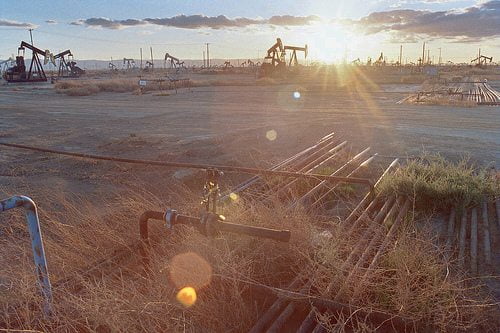

Economy
Jeremy Leggett’s call to arms on the energy of nations
Jeremy Leggett is a leading advocate of clean energy. At a recent Forum for the Future event, he gave an impassioned call to arms for renewables. His latest book is The Energy of Nations: Risk Blindness and the Road to Renaissance.
A former award-winning geologist, Leggett is founder and chairman of Solarcentury and its sister foundation SolarAid, and chairs the Carbon Tracker Initiative. He is also an associate fellow of Oxford University’s respected Environmental Change Institute. His transition from oil and gas consultant and researcher (funded by BP and Royal Dutch Shell) to renewables champion was triggered by his growing concern about global warming. This is someone who knows about both the fossil fuel and renewable energy industries.
Leggett was introduced by co-founder of the Forum, Sara Parkin, who described The Energy of Nations as a “page turner”. What followed was Leggett’s explanation of the five systemic risks that he covers in the book.
The oil shock is the increasing mismatch between inexorably rising demand for oil and its peaking (increasingly scarce) supply.
The climate shock is the ruinous economic and environmental effects of rising greenhouse gases and climate change from burning fossil fuels (a Royal Dutch Shell-shock).
Third is the coming financial crash, well-explained by serious economist and elder statesman of the Financial Times, Martin Wolf.
The fourth risk is the carbon bubble, exposed by Carbon Tracker, which systematically proved that many oil and gas companies were overvalued on reserves they simply could not burn.
Finally, Leggett punctured the dream of limitless, clean shale gas as a panacea. It is neither limitless nor clean, he said – as shale wells run dry, emissions still rise and the remaining blighted landscape looks like a heroin addict’s arm.
Divestment from fossil fuels is rampant, with some of the largest pension and sovereign wealth funds recognising the risk and putting their money elsewhere. The challenge is where to invest.
As one of the leading champions of solar energy, it would have been remiss for him not to point the continuing fall in price of renewable energy. The cost of solar panels has fallen approximately 100 times over since 1977, and solar panels today are about half the price they were in 2008. Parity with fossil fuels is here.
Most interesting about Leggett’s talk was his use of military analogies. To paraphrase, he said, “We are at war… they [the fossil fuel industry] are trying to kill us… We need guerrilla warfare.” Some may find such language off-putting. Sun Tzu’s Art of War and von Clausewitz’s Vom Kreige (On War) are essential texts for most business students, so as a business school alumnus maybe I’m biased, but the language certainly seems appropriate in the circumstances.
In 1914 and 1939, the world mobilised to face an existential threat. There can be no greater threat than climate change, even if it doesn’t come ready packaged with jackboots and a foreign language. We are fighting for our lives.
Arrayed against those who are genuinely concerned about the state of the planet are the machismo mining, drilling and investing sectors. As Cicero said, endless money forms the sinews of war, and the oil and gas industry has that. Just as the tobacco industry before and the slavery industry before that, the fossil fuel industry will do everything it can to defend the indefensible.
Leggett explored the psychology of oil and gas executives hooked on their own myths and propaganda: we’re entering a renaissance for fossil fuels, there isn’t a climate problem, if there is a problem it’s manageable and if it’s not manageable, we’ll find an easy technical solution.
Interestingly, some of those most critical of the industry are those who have recently retired, such as Jeroen van der Veer, former CEO of Royal Dutch Shell. This suggests big oil and gas executives feel they cannot criticise the industry while in post or are suffering from some groupthink.
If the first duty of a government is to keep its people safe, then the extreme weather resulting from climate change driven by burning fossil fuels needs to be addressed urgently.
Entertaining as it was disturbing, Leggett’s thesis is compelling. We face an existential threat and we need more people to enlist to fight this war. Reading his book would be a good place to start.
Further reading:
20 questions with… Jeremy Leggett
The climate clock is ticking. Normal isn’t working. What should we do differently?
Majority of Britons unaware of ‘carbon bubble’ investment risks
From ethics to sustainability: shifting the investment debate for 2014
Investors worth $3tn put pressure on fossil fuels industry to rethink future


 Environment12 months ago
Environment12 months agoAre Polymer Banknotes: an Eco-Friendly Trend or a Groundswell?

 Features11 months ago
Features11 months agoEco-Friendly Cryptocurrencies: Sustainable Investment Choices

 Features12 months ago
Features12 months agoEco-Friendly Crypto Traders Must Find the Right Exchange

 Energy11 months ago
Energy11 months agoThe Growing Role of Solar Panels in Ireland’s Energy Future



























